The Information and Communications Technology Council (ICTC) is pleased to present the ICT Sector Annual Review 2019, a report that explores broad trends over the past year in Canada’s digital economy with respect to economic impact, the labour market, technology adoption, and talent supply.
This 2019 review will be presented through a three-part blog series.
- Part 1: Economic Growth
- Part 2: The Labour Market
- Part 3: Talent Supply

Photo by Alex Shutin on Unsplash
The report utilizes historical data starting from 2009 through to 2019.
Canada’s ICT employment grew robustly in 2019, although this growth was unevenly spread across roles and sectors.
Employment in Canada’s digital economy grew by 3.8%. Employment in the ICT sector grew by 1.8%. This modest figure was mainly due to a 10% loss of non-ICT employment in the sector. By contrast, employment of ICT professionals in the ICT sector grew by 7.1%. The unemployment rate among ICT professionals was 2.8%, less than half the unemployment rate for the overall economy.
Growth in employment of ICT professionals varied widely across roles and sectors. Ten of 30 ICT National Occupation Codes saw a decline in employment; these losses were concentrated in the telecommunications sector, testing, and support technicians. By contrast, employment in roles such as Data Analysts and Electrical Engineers grew by double digits.
The sectoral composition of Canada’s ICT employment did not significantly change. About a third of ICT professionals worked in directly in the ICT sector, while 66% were employed outside. The professional, scientific, and technical services industry employed 40% of all ICT professionals. Other top sectors for ICT professionals were construction, public administration, and manufacturing.
Employment and unemployment
In 2019, 1,664,700 professionals were employed in the Canadian digital economy, a figure that is 3.8% higher than in 2018. The digital economy includes 500,600 ICT professionals working in the ICT sector; 965,900 ICT professionals working in other sectors of the economy; and 198,300 non-ICT professionals working in the ICT sector.
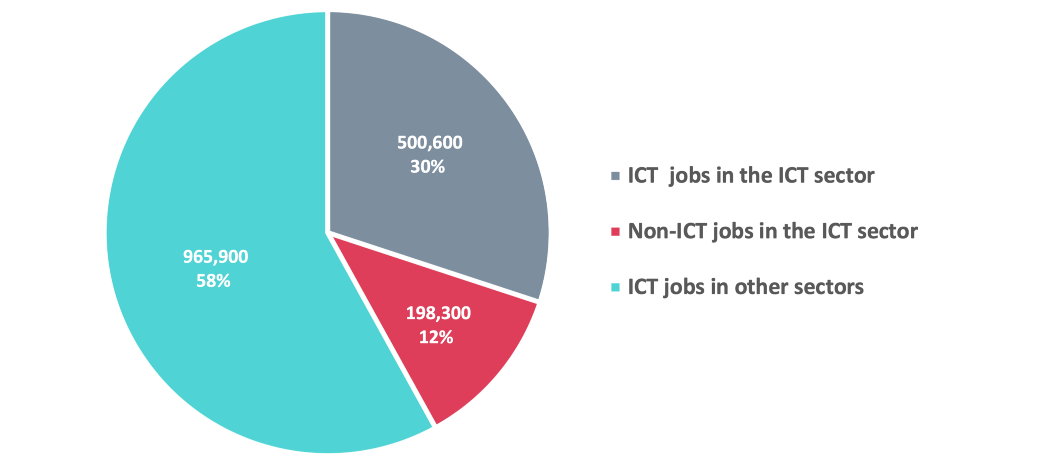
Employment segmentation of the digital economy, 2019 — Source: ICTC; Statistics Canada
In 2019, there were 698,900 professionals employed across the ICT sector, accounting for 3.7% of the Canada’s total employment. Driven by rapidly expending digital technologies and developments, employment in the ICT sector grew in 2019 by 1.8%, adding 12,200 new jobs. The lower job growth in the ICT sector in 2019 relative to previous years was attributable to a massive shedding of non-ICT professionals from the ICT sector. Over just one year, the number of non-ICT professionals working in the ICT sector dropped by 10% to 198,300 — its lowest level after a decade of staggered decline; there were roughly 243,100 non-ICT professionals working in the ICT sector in 2019. The number of ICT professionals working in the ICT sector, however, grew by 7.1% in 2019. The number of ICT professionals across the entire economy increased by 6.0% or 82,600 jobs during this period. The drop of non-ICT jobs in the ICT sector is consistent with the overarching narrative of digital transformation of the workplace. Technology that expedites the completion of rote administrative tasks is decreasing the need for administrative employees in tech companies, and money is instead being invested in technical roles across the economy.
Perhaps no sector is as disrupted by technological change as the ICT sector itself. Between 2018 and 2019, there was decline the number of employed workers in 10 of 30 ICT National Occupation Codes (NOCs). Several roles, primarily concentrated in telecommunications installation and technician roles, saw steep declines; employment of Telecommunications Line and Cable Workers (NOC 7245) fell by 49% to 6,800. Employment of Corporate Sales Managers (NOC 0601) fell by 37% to 13,500. Employment of Information Systems Testing Technicians (NOC 2283) fell by 37% to 8,600. Employment of Graphic Arts Technicians (NOC 5223) fell by 25% to 6,500. One of the largest numerical drops in employment was seen among User Support Technicians (NOC 2282), in which 4,700 jobs were lost. However, this was a small percentage decrease (4.5%).
By contrast, employment in several ICT occupations grew precipitously in 2019. The top growth areas were Data and Information Analytics, Programming, Media Development, and Electrical Engineering/Installation. Employment of Database Analysts and Data Administrators (NOC 2172) grew by 47% to 53,400. Employment of Electrical and Electronics Engineering Technologists (NOC 2241) grew by 20% to 35,600. Employment of Industrial electricians (NOC 7242) grew by 19% to 36,900. There were also large numerical increases in employment among Information Systems Analysts and Consultants (NOC 2171 — gain of 26,900 jobs), and Computer Programmers and Interactive Media Developers (NOC 2174 — gain of 14,500 jobs).
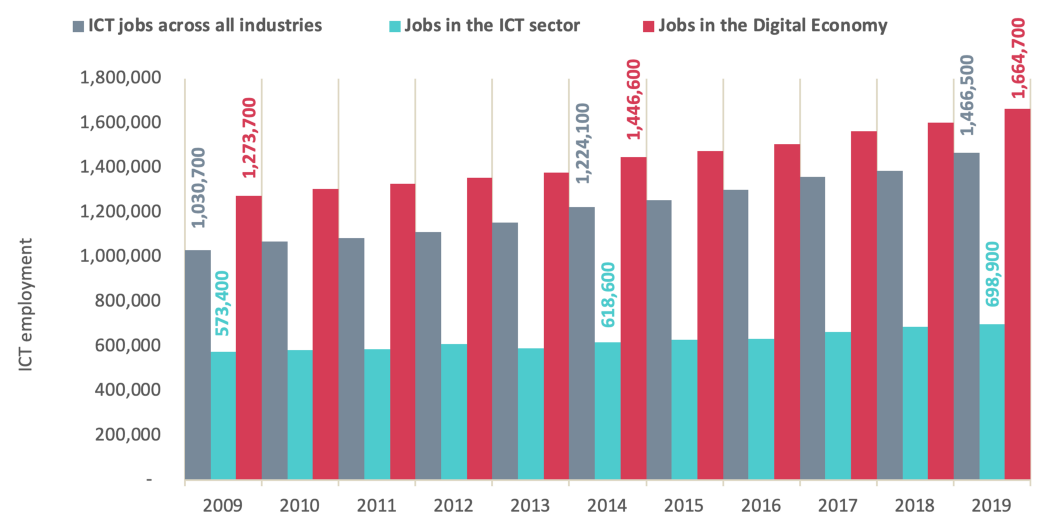
Employment in ICT and the Digital Economy, 2009–2019 — Source: ICTC; Statistics Canada
The unemployment rate for ICT professionals in 2019 increased slightly to 2.8%. This was less than half the employment rate for the overall economy, which was 5.7% in 2019.
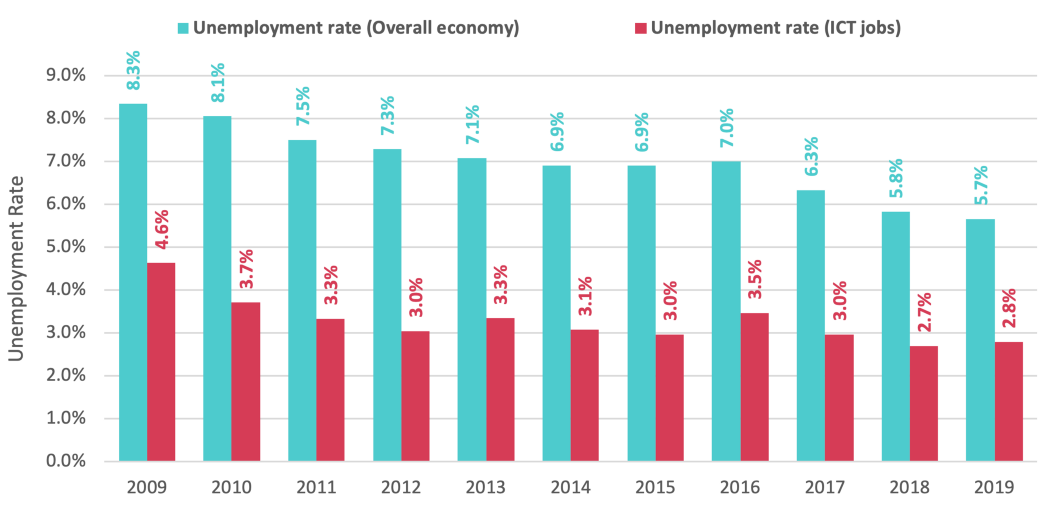
Unemployment rates, 2009–2019 — Source: ICTC; Statistics Canada
Employment by sector
All major sectors of the Canadian economy need ICT workers. In 2019, 66% of ICT workers worked in non-ICT sectors, while 34% worked in the ICT sector. These proportions were unchanged from 2018, and have been remarkably stable in the last ten years; in 2009, 33% of ICT workers worked in the ICT sector, while 67% worked in other sectors.
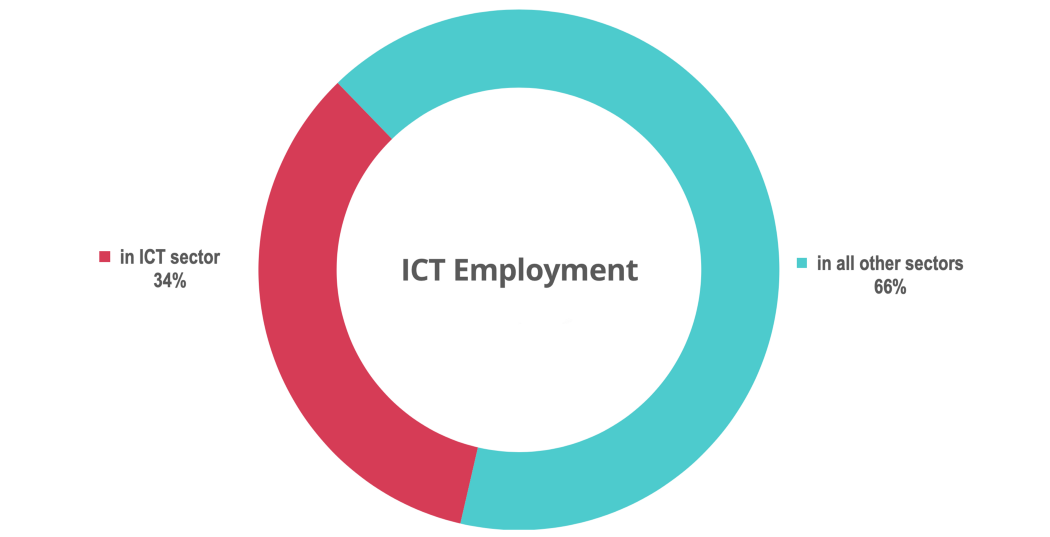
ICT employment, 2019 — Source: ICTC; Statistics Canada
Businesses in the professional, scientific and technical services industry employed 40% of all ICT professionals in Canada in 2019. The next top industries employing ICT workers were: construction (9%), manufacturing (8%), information, culture, and recreation (8%), public administration (8%), and finance/insurance (7%). The remaining 20% of ICT professionals worked in other sectors.
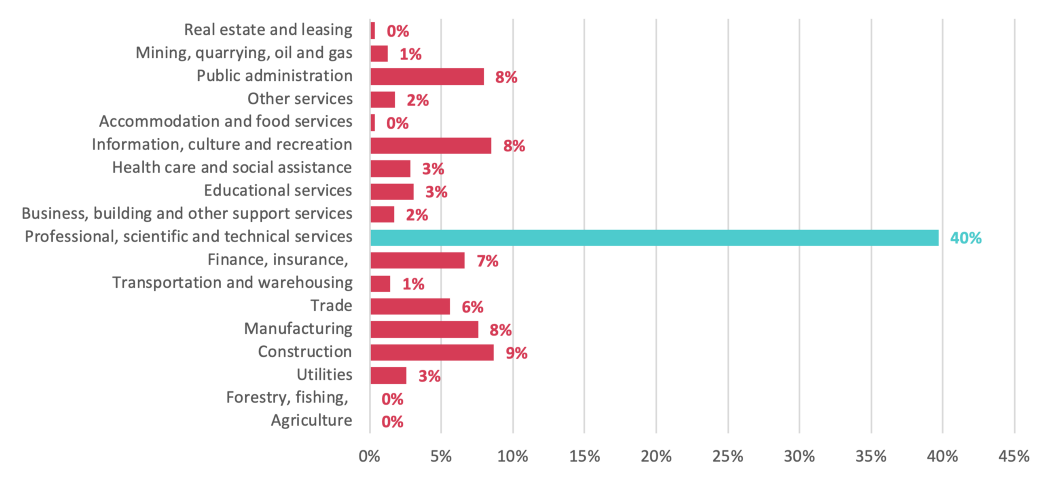
ICT employment by industry, 2019 — Source: ICTC; Statistics Canada
Canada’s digital economy has a lot to look forward to — in the long term
Greater technology adoption holds tremendous promise for the entire Canadian economy. While the ICT industry is a key pillar of Canada’s economy and has seen substantial growth, its growth is only a small part of the economic impact of technology in Canada; roughly two-thirds of Canada’s ICT employees work outside the ICT sector. Technologies such as AI are being rapidly adopted to deliver value in sectors as diverse as Agriculture, Manufacturing, Retail, Resource Extraction, and Health.
Whether Canada can continue exploiting its digital potential will depend on whether Canadians are equipped with the skills to innovate new technologies and adopt existing ones to create value. Ensuring Canadian workers have the talent to create and use technologies is more critical than ever before. Partnership and communication between industry, government, and the education sector can be leveraged to ensure a smooth pipeline of talent that creates start-ups and satisfied the needs of established employers.
Interested readers are encouraged to review ICTC’s recent research exploring the long-term labour market outlook, talent solutions, and the adoption of digital technology by Canadian enterprises of all sizes. These studies provide insight at the municipal, provincial and federal level. This insight is designed to assist employers, policymakers and educators to optimize their contributions to the digital economy through appropriate policies and training programs.
Recent ICTC insights, studies, and solutions addressing these issues include:
- On The Edge of Tomorrow: Canada’s AI-Augmented Workforce
- Building Canadian Consensus: Our Maturing Blockchain Ecosystem
- Canada’s Growth Currency: Digital Talent Outlook 2023
- Smart City Priority Areas and Labour Market Readiness for Canadians
- A Digital Future for Alberta
- Developing Cyber Talent for Canadian Critical Infrastructure — Road Transportation
- 5G Jumpstarting our Digital Future
- ICTC’s Perspectives on a Data Economy Strategy: Empowering Canada’s 4th Industrial Revolution
